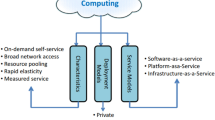Abstract
In the last decade, online social networks have seen a boom with respect to the use and applications. Many users upload large quantity of data that may risk the data security and access control. Trust-based access control strategy was used initially for the owner and his friends in order to restrict the data access using a well defined Trust Rule. The paper has implemented trust-based access control depending on the different roles played by the user. User plays different roles like owner, contributor, disseminator and stakeholder. Aggregated trust score computation and security level computation has been calculated in multi-role environment depending on different multi-role scenarios The proposed novel concept solves the access control problem where the user plays multiple roles that have been further discussed.

Similar content being viewed by others
References
Takalkar, V., & Mahalle, P. N. (2015). Data confidentiality in online social networks: A survey. IJSR, 4(1), 78–82.
Takalkar, V., & Mahalle, P. N. (2015). Trustbook: A Trust-based access control in online social networks. WPMC, Global Wireless Summit.
Hu, H., & Ahn, G.-J. (2011). Multiparty authorization framework for data sharing in online social networks data and applications security and privacy XXV. DBSec 2011. Lecture Notes in Computer Science, Vol 6818. Springer, Berlin, Heidelberg.
Hu, H., Ahn, G.-J., & Jorgensen, J. (2013). Multiparty access control for online social model and mechanisms. IEEE Transactions on Knowledge and Data Engineering, 25(7), 1614–1627.
Omanakuttan, S., & Chatterjee, M. (2014). Experimental analysis on access control using trust parameter for social network. Berlin, Heidelberg: Springer.
Chang, W.-L., Diaz, A. N., & Hung, P. C. K. (2014). Estimating trust value: A social network perspective. New York: Springer.
Ziegler, C.-N., & Lausen, G. (2005). Propagation models for trust and distrust in social networks. Springer.
Hang, C.-W., Wang, Y., & Singh, M. P. (2009). Operators for propagating trust and their evaluation in social networks. International Foundation for Autonomous Agents and Multiagent Systems.
Villegas, W. A trust based approach for protecting user data in social networks. In CASCON'07 Proceedings of the 2007 conference of the center for advanced studies on Collaborative research.
Kuter, U., & Golbeck, J. (2007). SUNNY: A new algorithm for trust inference in social networks using probabilistic confidence models’. Association for the Advancement of Artificial Intelligence (www.aaai.org).
Liu, G., Wang, Y., Orgun, M. A., & Lim, E.-P. (2013). Finding the optimal social trust path for the selection of trustworthy service providers in complex social networks. IEEE Transactions on Services Computing, 6(2), 152–167.
Yeh, L.-Y., Huang, Y.-L., Joseph, A. D., Shieh, S. W., & Tsaur, W.-J. (2012). A batch-authenticated and key agreement framework for P2P-based online social network. IEEE Transactions on Vehicular Technology, 61(4), 1907–1924.
Van Hieu, D., Wisitpongphan, N., & Meesad, P. Analysis of factors which impact facebook users’ attitudes and behaviours using decision tree techniques. In 11th JCSSE (International Joint Conference in Computer Science and Software Engineering).
Hur, J. (2013). Improving security and efficiency in attribute based data sharing. IEEE Transactions on Knowledge and Data Engineering, 25(10), 2271–2282.
Yu, S., Wang, C., Ren, K., & Lou, W. (2010). Achieving secure, scalable, and fine-grained data access control in cloud computing. In INFOCOM, 2010 Proceedings IEEE. https://doi.org/10.1109/INFCOM.2010.5462174.
Shehab, M., Squicciarini, A., Ahn, G.-J., & Kokkinou, I. (2012). Access control for online social networks third party applications. Computers & Security, 31, 897–911.
Hur, J. (2013). Attribute-based secure data sharing with hidden policies in smart grid. IEEE Transactions on Parallel and Distributed Systems, 24(11), 2171–2180.
Goyal, V., Wang, C., Ren, K., & Lou, W. (2010). Attribute Based Data Sharing with Attribute Revocation. ASIACCS’10, Beijing, China. Copyright 2010 ACM 978-1-60558-936-7, April 13–16, 2010.
Takalkar, V., & Mahalle, P. (2015). Handling data confidentiality attack due to data sharing using trust-based approach in online social networks. International Journal of Engineering Research and Technology 4(5).
Author information
Authors and Affiliations
Corresponding author
Rights and permissions
About this article
Cite this article
Takalkar, V., Mahalle, P.N. Trust-Based Access Control in Multi-role Environment of Online Social Networks. Wireless Pers Commun 100, 391–399 (2018). https://doi.org/10.1007/s11277-017-5078-2
Published:
Issue Date:
DOI: https://doi.org/10.1007/s11277-017-5078-2




